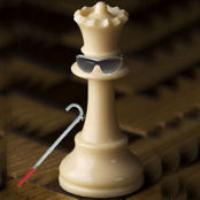
Chess blindness or neuronepaenia?
Do you suffer from chess blindness? Do you sometimes, in spite of the relatively unlimited time allowed on chess.com, make an error that would have been obvious to a backward five year-old with a squint?
I do, and I never realised why until my wife diagnosed a game I lost to Chriswray this week.
Check out the following position.
My knight on d5 would love to leap to f6, forking king and queen but the square is guarded by the g7 bishop, which I need to divert. So I played 24.Bxh6, cleverly winning the pawn. It was only after Chris, who must have thought I'd taken an insanity pill, captured the bishop that I realised that his rook was also covering f6 and I was suddenly a piece down.
It doesn't take a player of Chris's ability long to turn that kind of material advantage into a win and eight moves later I was forced to resign.
Later I told my wife, Lynne, about it as I sobbed into my breakfast cereal and, good wife that she is, she said, “It wasn't your fault. It's just your neuronepaenia at work again.”
That wasn't a helluva lot of consolation. After all, in medicine the suffix -paenia means that there is a deficiency, or that something is missing.
And neuronepaenia?
No brains!

